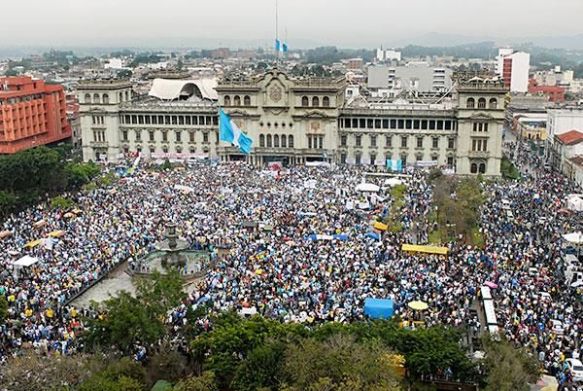
Tens of thousands of Guatemalans weathered a downpour last Sunday in a powerful demonstration of civic solidarity. Not satisfied with the resignation of the Vice President, many are asking that the President himself step down. Others carried signs demanding that congress pass stalled legislation aimed at tightening campaign finance rules and make government contracting processes more transparent.
Positive political events in Guatemala? Who ever heard of such a thing? It has been a long time indeed. But recent events have unfolded in ways that almost no one could have predicted. As a result of solid investigative reporting from the national newspaper El Periodico and the intellectual/political blog Plaza Publica (founded and funded by the Jesuits’ Universidad Rafael Landivar) combined with widespread outrage expressed nonviolently in the central square each Sunday by Guatemalans from across the political spectrum, Guatemala is undergoing a kind of political consciousness-raising the likes of which only its very oldest citizens could recall. It’s too early to say what the full outcome of this series of national non-violent demonstrations will be, but already the effects have reverberated throughout the nation and within the halls of congress and the presidential palace. After a series of well-documented corruption scandals pointing directly to Vice President Roxanna Baldetti, the political tides turned sufficiently against her that she was forced to resign last week and is likely to stand trial for her connections to a contraband and tax-fraud network called La Linea. There is a fair bit of evidence to suggest that (former army general) President Perez Molina himself has connections to the network and, feeling the heat from crowds of tens of thousands of protesters amassing in the central square seeking his resignation, the President has attempted further “damage control” by rescinding several obviously corrupt government contracts he vehemently defended as legitimate only weeks ago. In the end, though, the most important potential outcome is neither the rescinded contracts nor his resignation, which may or may not come, but rather the “window of opportunity” suddenly open for the possibility of passage of a campaign finance reform bill that congress has studiously ignored for years. Congressional deputies have ignored it not only because the media has traditionally shown interest only in election-year horse races, but also because the deputies and political parties have for decades depended on loose or non-existent campaign rules in order to be able to raise money from political “investors” seeking the benefits of having friends in high places. Indeed, according to a detailed report by the International Crisis Group in 2011, Guatemala has one of the most expensive election cycles in the region precisely because, much like in the US after Citizens United, the political machinery is structured to be wide open for spending on political candidates. [The situation is even worse in Guatemala because there is very little transparency about who is doing the investing.] The fact that even CACIF, the enormously powerful chamber of commerce, is supporting this reform (albeit with fairly tepid enthusiasm) is profoundly surprising and exciting. Just as important, across the political spectrum, on Facebook pages and in everyday conversations, Guatemalans are talking politics — and not even mentioning candidates or parties. Instead they are talking about the need to put pressure on both the executive and the legislative branch to put a stop to the rampant corruption that, for so long, has become so commonplace as to be virtually expected of the political class. It seems that the experience of organizing for political protest — and seeing almost immediately palpable results — may be injecting a new and much-needed optimism into Guatemala’s politics. It’s about time.
[Update: The attempts at damage control continued yesterday with the announcement of several additional resignations including Michelle Martinez, the “Minister of the Environment” (a position she managed to achieve without even acquiring a college degree, much less a degree in science) and Gabriela Aparicio, Guatemalan Consul for Miami, who, prior to being named head of the Miami Consulate, held the distinguished title of personal make-up artist for the (now ex-) Vice President, Roxana Baldetti.]

